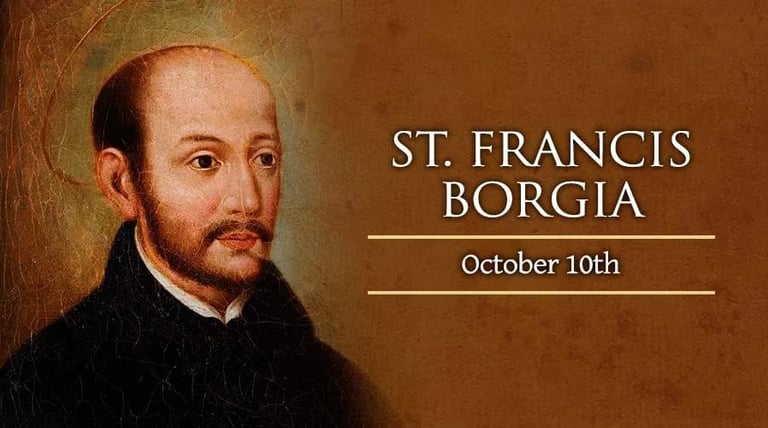Saint of the day October 10, 2024
St. Francis Borgia
DAILY SAINT
Nirmala Josephine
10/10/20243 min read


St. Francis Borgia was born October 28, 1510, in Gandia, Valencia, Spain as the son of the Duke of Gandia, the great-grandson, from his father’s side, of Pope Alexander VI, the notorious Borgia pope, and his mother’s side, the great-grandson of King Ferdinand of Aragon.
Francis’ grandmother joined her daughter in a convent of Poor Clares after her husband's death and held a pious influence in the court of the Borgia, to which Francis is indebted. It was with these two women that holiness penetrated into the scandalous lineage of the Borgia family.
Francis grew to be a pious young man, possessed of many natural gifts and a favorite at the court of Charles V. It is recounted that one day Francis passed through Alcalá, followed by his escort, and exchanged an emotional glance with a poor man being escorted to prison by the Inquisition. This man was Ignatius of Loyola, and at this moment Francis could not have had any idea what an important role this man would play in his destiny.
In 1539, Francis was appointed Viceroy of Catalonia, and four years later, upon the death of his father, the Duke of Gandia, he built a university there, received the degree of Doctor of Theology, and invited the Jesuits to his duchy.
His wife died in 1546, and Francis entered the Society of Jesus in 1548, but was ordered by the Pope to remain in the world until he had fulfilled his obligations to his ten children and his duchy.
Two years later he left Gandia, never to return, and joined the Jesuits in Rome. He immediately set about initiating grand projects – he convinced Ignatius to found the Roman College, and a year later he left for Spain, where his preaching and example sparked a renewal of religious fervor in the country, drawing pilgrims from far and wide to hear him preach.
In 1556 he was placed in charge of all the missions of the Society, and his energetic work transformed them. He also initiated the missions to Peru, New Spain, and Brazil.
He was elected as general on July 2, 1565, and although in poor health for his last years, he executed the governance and initiated projects of the Society with great energy. He introduced so many reforms to the society of Jesus that he was considered in some ways to be its second founder. Francis was a man of contemplation and action in the fullest sense, and clearly drew much strength from the silence of his prayer.
He died in Rome on September 30, 1572, in Ferrara, Spain, two days after returning from an apostolic journey to Spain.
Saint Francis Borgia is one of the great saints of the Catholic Reformation and was canonized by Pope Clement X in 1670.
Reflection
St. Francis Borgia’s success as an administrator was so impressive, that he is often called the second founder of the Jesuit order. He gave the order vitality at a time when the Church in Europe was greatly distressed and the faithful were suffering. Kings and Popes respected his wise counsel. To the missionaries in the Far East and the Americas, he wrote numerous personal letters of fatherly guidance. Despite his many talents, he preferred to live a simple life and never lost his desire for prayerful solitude. As a member of the often-notorious Borgia family, he could have led a life of comfort and privilege but chose to give it all up to dedicate himself tirelessly to spreading the Kingdom of Jesus Christ.
St. Francis Borgia did not merit his halo just because he was a good executive. He was also a thoroughly good man, with a great zeal for personal perfection, for works of mercy, and for the reconstruction of the Catholic Church which had been badly shaken by the Protestant Reformation. Thus, St. Francis Borgia has been well described as “one of the sweetest, dearest, noblest men our poor old world has known.”
Sometimes the Lord reveals his will for us in stages. Many people hear a call in later life to serve in a different capacity. We never know what the Lord has in store for us.
